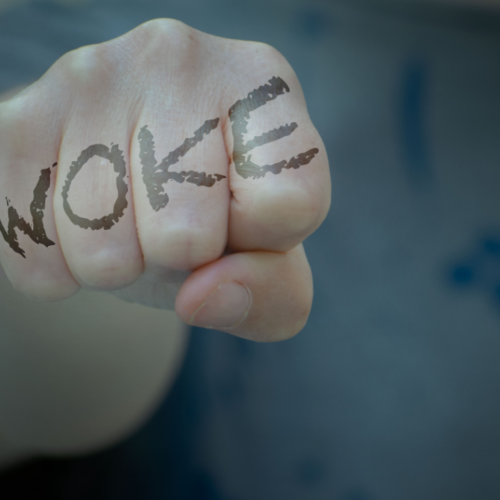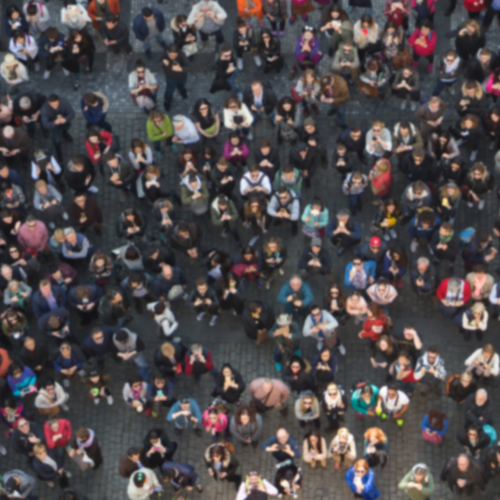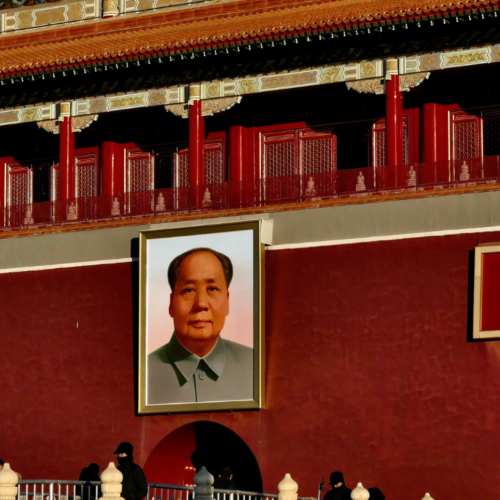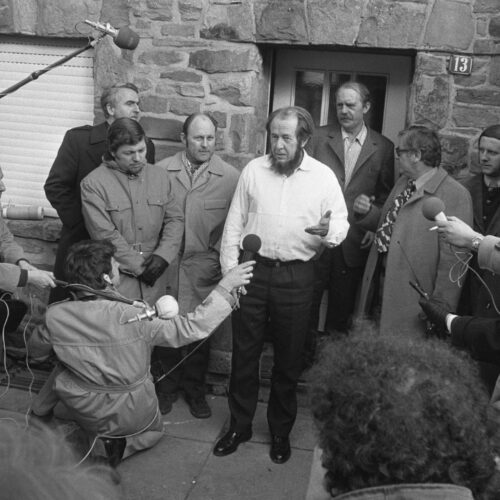Dostoevsky: Prophet of Woke Insanity
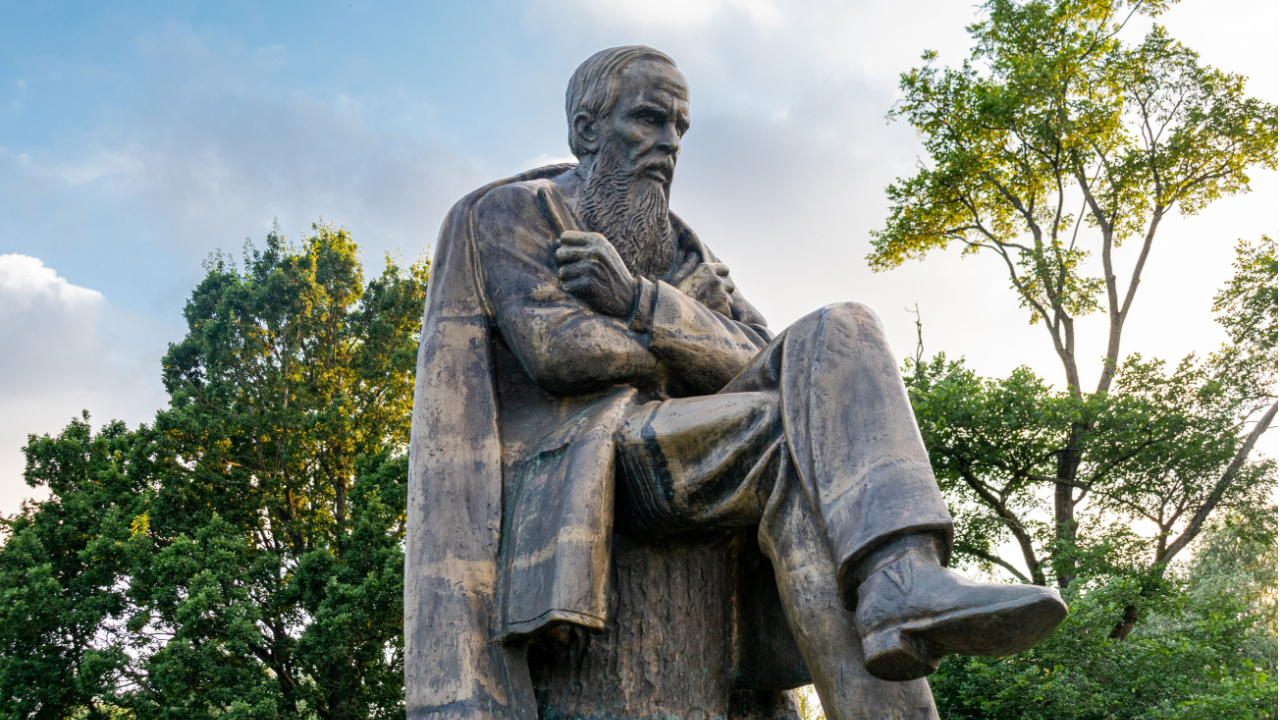
Editor’s Note – Daniel Mahoney explains how we can learn urgently important truths about the nature of woke totalitarianism from nineteenth century Russian novelist Fyodor Dostoevsky. In his great novel Demons, Dostoevsky offers an “unerringly accurate diagnosis of the sickness of soul that drives the totalitarian temptation.”
The woke totalitarianism that is descending on America is driven by the same moral fanaticism that gave birth to the totalitarian horrors of the 20th century. Just reflect for a moment on the pro-Hamas protests and riots that spread across America celebrating (!) the unspeakable atrocities of October 7, 2023. What these pro-Hamas rioters demand for Jews, is exactly what the woke totalitarians demand for America—annihilation. Great resources of spiritual strength, courage, and wisdom will be needed to withstand and overcome this demonic assault. Fortunately our great heritage of Western civilization offers us these resources in abundance.
This essay was originally published at Law & Liberty on January 3, 2022 under the title “Encountering the Spirit of Revolutionary Negation.”
Many… greeted the twentieth, as a century of elevated reason, in no way imagining the cannibalistic horrors that it would bring. Only Dostoevsky, it seems, foresaw the coming of totalitarianism.
—Aleksandr Solzhenitsyn (1993)
The 150th anniversary of the publication of Dostoevsky’s Demons (also known as Devils and perhaps less accurately as The Possessed) provides a welcome opportunity to reengage this timely and timeless literary dissection of moral and political nihilism. In it, Dostoevsky gathered all his imaginative and prophetic powers to confront the spirit of radical negation that defines the modern revolutionary project. This powerful novel is at once an unerringly accurate diagnosis of the sickness of soul that drives the totalitarian temptation as well as an inexhaustible literary monument to the ideological scourge that is coextensive with late modernity. It is at moments darkly humorous even as it delves into spiritual and political pathologies of the first order.
As Aleksandr Solzhenitsyn remarked about his great literary and spiritual forbear, Dostoevsky had an uncanny ability to see both profound truths about the soul and the human condition, and to foresee in all its demonic depths the totalitarian tragedy that would come to mark and deform the twentieth century. In L’homme revolté (1951), another Nobel Laureate in literature, Albert Camus, turned to Dostoevsky to rescue himself from the moral abyss that haunted existentialism and to diagnose the totalitarian temptation in all its amplitude. As we in the United States confront new waves of moralistic fanaticism and toxic nihilism, as spiritual and cultural repudiation have become both fashionable and obligatory, and as many young people and pseudo-intellectuals bow before the cult of revolution and increasingly fashionable nostalgia for Communism, it is time to turn once again to Dostoevsky’s jarring literary and political masterpiece as a source of unsurpassed spiritual nourishment and untimely wisdom.
In this essay, I will not be foolish or daring enough to try to summarize Dostoevsky’s achievement in that work or to sketch the argument and action of Demons as a whole. Throughout I have drawn on the translation of Demons by Richard Pevear and Larissa Volokhonsky (Vintage/Random House, 1994). Instead, I will highlight some of its more evocative and instructive themes and passages to help us limn a path forward amidst our debilitating contemporary crisis. I will tentatively suggest that Dostoevsky’s positive vision or alternative to the regnant nihilism is perhaps less convincing or compelling than his unerring diagnosis of the demons that are revolutionary nihilism, political atheism, “half-science” or scientism, and an incipient totalitarianism that combines moral fanaticism with contempt for the primordial [universal] distinction between good and evil.
The Faces of Evil
If Dostoevsky successfully resists the demonic abstractions of the age, he never covers over the personal face of the evil that threatens the spiritual and political integrity of modern peoples. In that sense, his main characters are indeed concrete carriers of demonic evil. They are literally possessed by the spirit of negation or destruction that defines what Christ in the Gospel of John calls “The Father of Lies.” The brilliant, handsome, and charismatic Stavrogin, né Nikolai Vsevolodovich Stavrogin, literally embodies gifts gone terribly awry, a natural aristocrat (of sorts) who inexorably leads everyone astray. Confused by his simple wife (whom he married on a mischievous lark) for a prince and by the secret revolutionary circle (to which he is tied without exactly being a member) for the consummate revolutionary leader, his ability to lead is marked only by the preternatural ability to corrupt them. His alluring charisma draws people in even as he does not hesitate to manipulate and sully souls. Beyond his superficially aristocratic countenance, he is decisively “beyond good and evil.”
Stavrogin’s arrival in a fictional Russian provincial town ultimately unleashes evil pure and simple. He has raped and killed because his soul craves perverse pleasure, an ironic indifference to good and evil, and ultimately a form of self-deification that is inseparable from self-destruction. He halfheartedly and ultimately insincerely attempts a confession, but the holy retired Bishop Tikhon, who lives in the same town, sees through his perverse manipulations. Stavrogin wishes to be free of all “prejudices,” including the one that leads a decent soul to prefer good to evil. As Bishop Tikhon discerns, Stavrogin’s is a heart “wounded unto death.” Along the way, the faux aristocrat does nothing to discourage the engineer Kirillov from choosing the path of suicide as a means of self-deification through the triumph of “self-will.” In shooting himself, in escaping fear and pain, but also the benevolent sovereignty of God, Kirillov believes he will become a “man-God” through the act of pure, willful negation. His is another path to Stavrogin’s deadly goal of sustained revolt against the order of creation.
In different ways, Kirillov and Stavrogin choose to become “Autonomous Men” in a truly demonic manner. This decision can only lead to suicide, murder, and spiritual madness. Their paths are less directly political than the circle of revolutionary nihilists depicted in Demons. But in a certain sense it is even more demonic since they aim less at an “earthly paradise”—however misbegotten—than becoming gods, or anti-gods, themselves. With both, self-affirmation is inseparable from nihilistic self-destruction, from spiritual and physical suicide.
Political Nihilism and Egalitarian Despotism
The tiny circle of revolutionary nihilists in Demons are modeled on the real-life cell in St. Petersburg around Sergei Nechaev. This conspiratorial circle preached the gospel of revolutionary destruction and ended up in 1869 murdering an apostate from their movement named Ivan Ivanov who had distanced himself from their revolutionary psychosis. This world too is “beyond good and evil” and quite emphatically so. The leader of this madcap circle in Dostoevsky’s novel, at once demonic and absurd, is the purely malicious Pyotr Stepanovich Verkhovensky. He leads the lost and willful souls in his nihilist revolutionary circle to believe that they are one of untold numbers of such circles prepared to unleash revolutionary destruction in Russia as a whole. He is a master manipulator of his revolutionary underlings who sense his malice towards them even as they act as his obedient foot soldiers. When the action begins in Demons, the younger Verkhovensky has only recently returned to town. But his destructive presence is immediately felt by all. He plots murder and mayhem with singular determination. He privately admits that he is a “crook” as well as a “socialist,” although the two avocations are by no means in contradiction in his mind or that of others.
Within days, he has become the manipulative intimate of Yulia von Lembke, the wife of the liberal governor of the province. She is not alone among “educated society,” as one put it in Russia at the time, in coddling and admiring the “progressive little notions” that they heard and saw on display from the nihilists. Dostoevsky chronicles the pathetic, slavish deference of liberal society toward incipient totalitarianism with dark and biting humor. The Governor, Andrei Antonovich von Lembke, only sees the revolutionaries for the heartless and destructive nihilists that they are after they unleash murder, arson, and mayhem at Yulia von Lembke’s literary soirée and ball to help local governesses. He ludicrously compares himself to a “Tory” who will stabilize and restrain the untried and unhinged ideas of the revolutionary “Whigs.” This analogy is so preposterous that it is hard to believe that anyone in a position of political responsibility could believe it in the first place. The “Tories” Governor von Lembke refers to are indulgent progressives and no “liberals” at all. And the “Whigs” in the story are nihilistic revolutionaries and hardly defenders of true human freedom. The analogy is strained, and in the end utterly illusory.
At the heart of Demons is the revolutionary program of the nihilists themselves. Here Dostoevsky discerned where revolution leads with perfect accuracy.
Father and Sons
Pyotr Stepanovich Verkhovensky did not emerge out of thin air. He is the son of Stepan Verkhovensky, a liberal progressive intellectual of another era. A protégé of Varvara Stavrogina, an aristocratic and one time owner of “souls” (serfs) who prides herself on her openness to fashionable ideas and to the life of culture more generally, she wants a house intellectual around to keep her informed and cultivated (and sufficiently, but only, sufficiently progressive to boot). Her relationship with père Verkhovensky is at once strained, affectionate, authoritarian, and high-strung. Varvara dotes on her son Nikolai, but deep-down senses that something is terribly wrong. The liberal idealist Stepan Verkhovensky both neglected his son (whom he sent away to various aunts to educate and raise) and “educated” Stavrogin himself rather haphazardly and to disastrous effect.
Stepan Trofimovich Verkhovensky is intellectually incoherent but less than fully aware that he has been playing with fire. He fights terribly with his son Pyotr Stepanovich, whose destructive ideas and ferocious temperament truly frighten him. In one scene in chapter 4 (“All in Expectation”) the two “discuss” Nikolai Chernyshevsky’s extremist revolutionary tract What is to be Done?, whose title and destructive revolutionary nihilism would be freely adopted by Lenin himself. Stepan studied the novel to see where this strange destructiveness had its roots. He wanted to know—and rebut—their revolutionary “catechism.” But Stepan begins by making a fatal concession: “I agree that the author’s basic idea is correct,” and quickly adds “but so much more horrible for that!”
By affirming the revolutionary ideal that animates this turgid and nihilistic catechism, Stepan has left himself vulnerable to the more willful and consistent affirmations of his son. Père Verkhovensky wants to be “progressive” without drawing all the revolutionary and nihilistic conclusions inherent in his position. But starting with the first premises of revolutionary ideology, it is hard to cogently argue that it has been “perverted, distorted, mutilated!” as Stepan does. Pyotr Stepanovich can readily mock his father for his incoherent mixture of decency and progressive ideology. Pyotr is thus the faithful heir of What is to be Done?, as Lenin would be a generation or two later. Verkhovensky fils knows that his father cannot have it both ways. In that exchange, the Russian generational conflict between liberal, progressive fathers and nihilistic sons is brilliantly encapsulated.
Stepan Trofimovich ultimately redeems himself in a “conversion” that, while not straining credulity, is less than completely believable. At Yulia Mikhailovna von Lembke’s ball, Stepan proclaims his fidelity to beauty and argues that Shakespeare and Raphael are more important than any revolution—or even the freeing of the serfs. They represent a “beauty” that is above all sociopolitical concerns. After the revolutionary conflagration, a sickly Stepan Trofimovich, consumed by fever, asks for the account of the Gadarene swine (Luke: 8-32-36)—which serves as an epigram to the book, as a whole—to be read to him. He now immediately appreciates the demons of that famous scriptural passage for who they are. He commits himself to fighting “the big and little demons” that have “accumulated in our great and dear sick man,” the Russia that he has always loved (characteristically affirmed in French, the language of educated society and intellectual pretense). Delirious and on the verge of losing consciousness, Stepan dedicates himself to preaching the Gospel and to loving poor, sick Russia. Compared to his son, he was only partially possessed all along. But his demons, “insane and raging,” have now gone over the cliff, too. His conversion is a sign of hope and perhaps foreshadows a promising restoration of political and spiritual sanity.
At the heart of Demons is the revolutionary program of the nihilists themselves. Here Dostoevsky discerned where revolution leads with perfect accuracy. Pyotr Stepanovich champions the revolutionary program of Shilgalyov, a revolutionary theorist possessed by ideology of the most fanatical kind, and down to the smallest details. Shigalyov, the younger Verkhovensky almost madly proclaims “invented equality!” The new egalitarian despotism, “paradise on earth,” will self-consciously create “equality in slavery.” True freedom, Shigalyov insists, can only be found in “perfect despotism.” Everything must be levelled since high aspiration, spiritual or intellectual, gives rise to dreaded inequalities. Human greatness, high and noble aspiration, must be crushed and beaten out of the human soul. Slaves, we are told, need rulers, and egalitarianism demands despotism of an unprecedented variety.
This demonism knows no limits: Since higher abilities cannot be tolerated but instead must be warred on, nobility must be “banished or executed.” In this paradise-turned-nightmare, “Cicero’s tongue is cut off, Copernicus’s eyes put out, Shakespeare is stoned—this is Shigalyism!” Pyotr Stepanovich, following Shigalyov, unabashedly declares that there can be no freedom or equality without a truly inhuman and unprecedented kind of despotism. With unerring accuracy, the younger Verkhovensky tells us that 100 million people will perish at the hands of egalitarian and socialist despotism, the exact number of the victims of Communism in the 20th century chronicled by 1998’s The Black Book of Communism. The great Dostoevsky could truly see…
The Party of Nihilism
In this same remarkably revelatory chapter (Chapter 8—“Ivan the Tsarevich”), Pyotr Stepanovich Verkhovensky chronicles all the “soft utopians” (the phrase is Reinhold Niebuhr’s) who have already succumbed to moral nihilism and political insanity: children who have been taught by their teachers to laugh at God, lawyers who shamelessly defend the deeds of murderers for fear of being insufficiently progressive, schoolboys who kill “just to see how it feels,” academics who defend murder as either a sign of insanity or material necessity, but never of evil. They are “ours,” he proclaims, fellow-travelers and even unbeknownst foot soldiers of the party of nihilism. Many are “drunk” with ideology; many more will “get themselves even drunker,” inebriated by the cult of revolution, half-science, angry atheism, and contempt for all permanent standards and solid foundations for the indispensable distinction between good and evil.
Dostoevsky’s book speaks not only to the crisis enveloping Russia (one tied to, and initiated by an intelligentsia that hates God, morality, country, and simple decency), but to the spiritual and political crisis that is coextensive with late modernity itself. Demons is a book for East and West alike, one for all those who wish to rescue the soul of modern man. With the descent into open nihilism comes the paradoxical possibility of spiritual (and political) resistance to these demons who have taken monstrous human form.
Dostoevsky is thus our master diagnostician of the entire soul-destroying project to replace God and the nation with all-consuming “self-will” and the nihilistic and eternally self-negating effort to turn Man into God. Yet, as in all his master works, the representatives of the forces of evil at times sometimes seem more powerful, evocative, and memorable than the forces of truth and goodness. A cursory comparison in The Brothers Karamozov of Ivan Karamazov to his brother Alyosha or to even Father Zossima supports this point. Alyosha and Zossima seem less substantial, and perhaps too meek or other-worldly, to truly take on the forces of demonic destruction. And the Christ of “The Legend of the Grand Inquisitor” says not a word but only gives the ominous Grand Inquisitor a kiss of peace—a powerful gesture, but one accompanied by passivity and extreme otherworldliness.
Of course, as Alain Besançon has noted, the writings of Dostoevsky have led many to convert to Christianity. Figures such as Konstantin Mochulsky, Romano Guardini, René Girard—and I would add Nikolai Berdyaev and Henri de Lubac—have found in Dostoevsky a voice of compelling Christian faith. Yet, in Dostoevsky’s works, the negation of atheism and all its works seems to this reader more powerful, more convincing, than the positive affirmation of the Christian alternative. This is not to deny the reality and efficaciousness of Dostoevsky’s faith, as much national as it is exclusively religious in character.
Dostoevsky and Shatov
One character who seems to speak for Dostoevsky in Demons is Ivan Pavlovich Shatov, the son of Varvara Stavrogina’s deceased valet, and a man of character and conviction who has freed himself from the grip of Stavrogin and the nihilistic circle around Pyotr Stepanovich Verkhovensky. As Jacob Howland has argued, he is one of the two characters in the book who genuinely convert, who switch from a false god to genuine faith and is ultimately “spiritually healed.” Near the end of the book, before he is murdered by the revolutionaries who rightly fear he will turn them in to the authorities, Shatov commits himself to “preaching” God and proclaims the necessity of repentance rooted in shared the guilt, the sinfulness that belongs to man as man. Shatov is an admirable character and largely a voice of truth. But, at the same time, his ambiguities largely reflect Dostoevsky’s own. His Slavophilism, admirable and insightful in important respects, is questionably and incompletely Christian, for reasons I hope to illuminate.
In a forceful and memorable exchange with Stavrogin in Chapter 1 of Part II of the book (“Night”), Shatov challenges Stavrogin’s demonic indifference to the distinction between good and evil and uses many of his words against him. He exposes the atheistic essence of socialism and the intimate connection between the nation and the affirmation of God. So far, so good. “Seeking for God,” he suggests, is at the heart of every great nation, culture, and people. Shatov powerfully exposes the despotism inherent in “half-science,” a rationalism and scientism that cannot distinguish good and evil. Once again Shatov is absolutely on the mark. But more troublingly, he defends the particularity not only of a people’s culture but of “its God.” And he unequivocally states that “every nation has its own idea of evil and good.”
This surely goes too far and completely undercuts the universalism inherent in Orthodox faith and any cogent affirmation of natural justice against radical or thoroughgoing cultural and moral relativism. Stavrogin sees an opportunity and suggests that Shatov has “reduc(ed) God to a mere attribute of nationality.” Shatov denies this, saying that he wants to “raise the nation up to God.” Shatov, like Dostoevsky at certain moments at least, seems to identify Russian Christianity with what Solzhenitsyn has called “messianic national exclusiveness,” which is at best a heresy and at worst a beguiling confusion and temptation. At the end of this exchange, Shatov affirms, “I believe in Russia, I believe in her Orthodoxy.… I believe in the body of Christ.… I believe that the new coming will take place in Russia.… I believe…” But when Stavrogin interrupts to ask Shatov if he believes in God the latter affirms “I… I will believe in God.” Shatov’s faith is thus a work in progress, as much a political faith as religious faith, as I have already suggested.
As we have already noted, Shatov’s religious conversion is more complete later in the novel right before he is cruelly murdered. Perhaps Richard Pevear and René Girard are right when they suggest that Dostoevsky sees and finally resists a certain temptation in Shatov’s (original) position, one that identifies Christianity too much with the “Russian God“ and the “Russian Christ.” There is undoubtedly much Dostoevsky in Shatov and much Shatov in Dostoevsky, too. But I concur with Girard that the glorious author of Demons and The Brothers Karamazov cannot be summarily reduced to Slavophile ideology. The literary Dostoevsky, the spiritual Dostoevsky, is never a counter-ideologist. His soul, his insights, his commitment to transcendent truth can never be encapsulated within the narrow confines of a socio-political or national project, however choice-worthy or partially true.
In any case, the Slavophile aspects of Dostoevsky’s thought and writings, his finding the mark of Christ in simple Russian people, and not spiritually desiccated intellectuals, is most beautifully articulated in his 1876 entry in The Writer’s Diary on “The Peasant Marei,” his father’s serf who comforted the young Dostoevsky when he believed he was being confronted by a dangerous wolf. Marei’s natural and Christian tenderness, his unforced kindness, came to Dostoevsky as a revelation when he recalled it as an adult. In the benevolence of this “bestially ignorant serf” he saw the mark of Christ and a sign of the “advanced” spiritual “development of our Russian people.” And in the famous “Pushkin Speech,” delivered in Moscow in 1880, Dostoevsky more successfully (and even sublimely) brought together his sense of “the mission of Russia” with “pan-European and universal” spiritual ideals rooted in the “general harmony,” the brotherly harmony and accord promoted by Christ’s Gospel. This harmony had nothing to do with the extinction of national distinctions that were for the Russian writer part of God’s providential design. The Christian affirmation of Dostoevsky is at once radically particularistic and profusely universalistic. Therein, I suspect, lies the source of both its luminous strengths and its alluring temptations.In conclusion, any engagement with Dostoevsky’s greatest works, including Demons, must be a personal engagement as well as a spiritual, political, and literary one. The diagnostic genius of this master work is self-evident and its ability to bring us back from the brink of nihilistic destruction is apparent to those with eyes to see. My hope is that others will be led to engage a book that offers so much light for us to see our way amid the cultural, spiritual, and political darkness of our time. Let us be thankful for the gift to East and West alike that is the art and wisdom and spiritual insight of Fyodor Dostoevsky.
Daniel J. Mahoney is a Senior Fellow at the Claremont Institute and professor emeritus at Assumption University.
